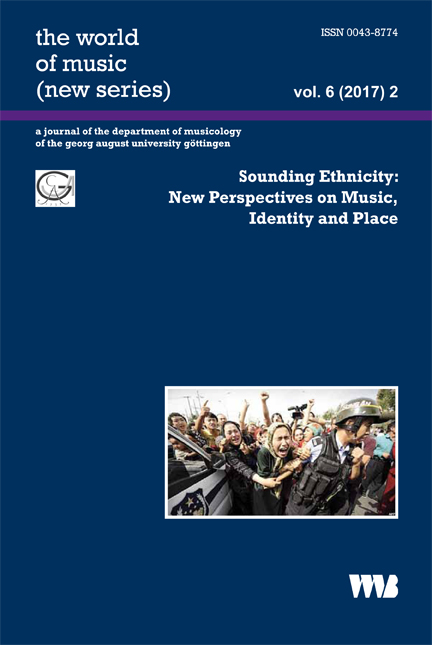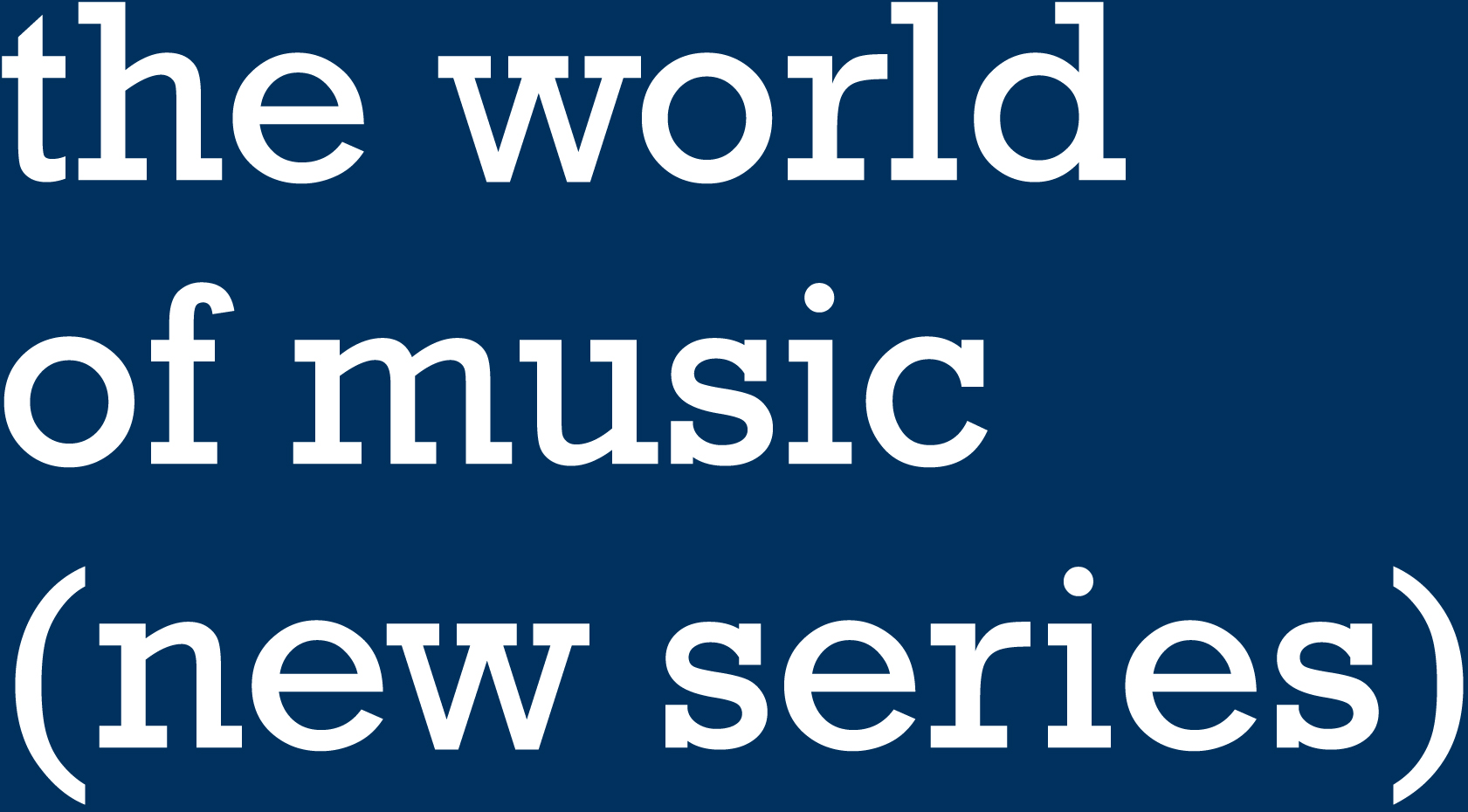Sounding Ethnicity: New Perspectives on Music, Identity and Place
the world of music (new series) Volume 6, Issue 2 (2017)
.:: Table of Contents
Introduction: Sounding and Silencing Ethnicity in the 21st Century
Lonán Ó Briain
Musical Ethnicity: Affective, Material and Vocal Turns
Martin Stokes
The New Battleground: Song-and-dance in China’s Muslim Borderlands
Rachel Harris
Which Identity Matters? Competing Ethnicities in Chinese TV Music Contests
Lijuan Qian
Who Are the Laz? Cultural Identity and the Musical Public Sphere on the Turkish Black Sea Coast
Thomas Solomon
Music, Multipartyism and the “Guinean Family”
Nomi Dave

.:: Book Reviews (Eva-Maria Alexandra van Straaten, Ed.)
Jayson Beaster-Jones, Music Commodities, Markets, and Values: Music as Merchandise (2016)
Peter Kvetko
Javier F.León and Helena Simonett (eds.), A Latin American Music Reader.Views from the South (2016)
Barbara Alge
Jennifer Kyker, Oliver Mtukudzi: Living Tuku Music in Zimbabwe (2016)
Tony Perman
Morgan James Luker, The Tango Machine: Musical Culture in the Age of Expediency (2016)
Kacey Link
Moshe Morad, Fiesta de Diez Pesos: Music and Gay Identity in Special Period Cuba (2014)
Yair Hashachar
Regine Allgayer-Kaufmann (ed.), World Music Studies (2016)
Stephen Wilford
Mark Pedelty, A Song to Save the Salish Sea: Musical Performance as Environmental Activism (2016)
Aaron S.Allen
Aida Huseynova, Music of Azerbaijan: From Mugham to Opera (2016)
Inna Naroditskaya
Mark J.Butler, Playing with Something That Runs: Technology, Improvisation, and Composition in DJ and Laptop Performance (2014)
Leah Kardos
Per Elias Drabløs, The Quest for the Melodic Electric Bass: from Jamerson to Spenner (2015)
Allan F. Moore
Nina Sun Eidsheim, Sensing Sound: Singing & Listening as Vibrational Practice (2015)
Niko Higgins
.:: Recording Reviews (Rehanna L. Kheshgi, Ed.)
Jones Fannie Lou Hamer: Songs My Mother Taught Me. Smithsonian Folkways Recordings (2015)
Alisha Lola
Playing ’Til Your Soul Comes Out: Music of Macedonia. Produced by Martin Koenig, recorded by David Jones.Smithsonian Folkways Recordings (2015)
Alexander Marković
Lakou Mizik. Wa Di Yo (You Tell Them). Cumbancha (2016)
Lauren Eldridge Stewart
——————————————————————————————————————————————————————————————————————————-
.:: Individual Paper Abstracts
Introduction: Sounding and Silencing Ethnicity in the 21st Century
Lonán Ó Briain
This article presents a brief survey of recent studies on musical sound and ethnicity in ethnomusicology and related disciplines. Current trends in vocal and sounded anthropology suggest new ways to approach ethnicity as a social category that shapes and is shaped by musical sound. Two ethnographic vignettes provide contrasting perspectives on the concurrent sounding and silencing of these large-scale social formations. The author’s forced removal from an ethnic minority concert in Hanoi illustrates one way that Vietnamese authorities regulate their structured celebration of minority identities. In Dublin, a solo performance by an Irish Traveller sounds the call for the legal recognition of Travellers as an ethnic group in Ireland. Finally, a summary of the articles illustrates the collective contribution of this issue to these ongoing debates.
Musical Ethnicity: Affective, Material and Vocal Turns
Martin Stokes
This essay reconsiders the introductory chapter to “Ethnicity, Identity and Music” (Stokes 1994). The contributions to the volume as a whole are located in the broader ethnicity paradigms developed by Edwin Ardener (and his milieu) in Oxford in the 1980s, and the original theoretical model of the introductory chapter is clarified. Seen in the light of more recent theorisations of affect, materiality and voice, one can see not only the limitations of Ardener’s ethnicity and identity paradigms, but also their continued theoretical salience, emphasising as they do the performativity of signs, the power relations implicit in muting, and the necessity of an integrated vision of history and ethnography. The article refers to, and discusses in passing, some ethnomusicological studies of Colombia, Italy and Turkey.
The New Battleground:Song-and-dance in China’s Muslim Borderlands
Rachel Harris
This article explores the tensions between formulations of ethnic and religious identity among the Uyghurs: a Turkic Muslim people who live mainly in northwest China. It traces the ways in which these tropes of identity are played out in discourse surrounding “song-and-dance” (naxsha-usul) in the transnational space of online web forums and social media posts which link Uyghurs in the “homeland” (weten)—the Xinjiang Uyghur Autonomous Region—with Uyghurs in the diaspora in Central Asia, Turkey, Europe and North America. China has long sought to depict its minority nationalities as people who are “good at singing and dancing,” and Uyghurs have also embraced musical performance as an important aspect of their national identity. Over the past twenty years, however, an Islamic revival has provided the context for new Uyghur voices that condemn song-and-dance as both un-Islamic and a tool of colonial oppression. There is a strongly gendered dimension to this discourse, which frequently casts Uyghur women’s bodies as the site of these contested identities. This article considers how Uyghurs, and especially Uyghur women, express and negotiate these shifting identities and shifting ethical norms through their embodied behaviours in a context where verbal debate is tightly controlled by state policies within Xinjiang and rigorously policed by Uyghur online activists in the diaspora.
Which Identity Matters? Competing Ethnicities in Chinese TV Music Contests
Lijuan Qian
This article reviews the performance of ethnic minority singers and singer-songwriters in both English-language and locally-devised talent show programmes in China from 2012 to 2017, asking how these musicians manipulate their multi-layered identities in order to balance their identity articulations, audience expectations and political pressures. Based on five years of watching the most widespread TV music talent show in China, the author provides comparative examples as to how ethnic minority singers and singer-songwriters create and negotiate ethnic-national, pan-ethnic and political identities. The most distinctive of these successfully open up new spaces for debate about identity, personhood, tradition and power in contemporary China. Data is drawn from the analysis of the music in question and from the decisions of programme judges, and also from the avid commentaries made by show viewers online during and after each round is broadcast.
Who Are the Laz? Cultural Identity and the Musical Public Sphere on the Turkish Black Sea Coast1
Thomas Solomon
This article discusses contrasting musical performances of identity on the eastern Black Sea coast of northern Turkey. This region is home to an ethnolinguistic group known as the Laz, but the term Laz is also used in a much broader sense in Turkey to refer to people from the entire Black Sea coast of Anatolia. Unflattering stereotypes abound in Turkish popular culture about Black Sea coastal dwellers, and a genre of Turkish popular music known as “Laz pop” plays extensively on these stereotypes. Since the 1980s a Laz cultural movement has sought to reclaim Laz identity through revitalizing traditional Laz culture, language and music. The article identifies three musical approaches to reconstructing Laz identity: cosmopolitan youth, back to roots and neo-traditional. All these musical ways of performing Laz identity are in dialogue with each other, forming a musical public sphere in which Lazness is negotiated not just through rational discourse in language, but also through performative gestures mediated through commercial recordings and videos.
Music, Multipartyism and the “Guinean Family”
Nomi Dave
In the Republic of Guinea, dissent—at times even democracy—is often blamed on ethnocentrism. As the country transitions from an authoritarian to post-authoritarian regime, dozens of new political parties have emerged, most often hewing closely to ethnic lines. While ethnic differences have always been present, felt, exploited, and manipulated in Guinea, their visibility and audibility in the form of multiparty politics has created new anxieties about division in the country. In response to this situation, Guinean leaders as well as ordinary citizens often turn to a well-worn and commonly heard phrase in the country, that “Guinea is a family.” Yet this seemingly innocuous phrase has a particular history to it, and is contentious and contested, in large part across ethno-political lines. In this article, I critically examine the notion of the Guinean family, as deployed by the state and cultural actors alike. I consider uses of this phrase in political speech and in music, and argue that in both of these cases, calls for unity around the Guinean family are in effect calls for political loyalty and against dissent.

